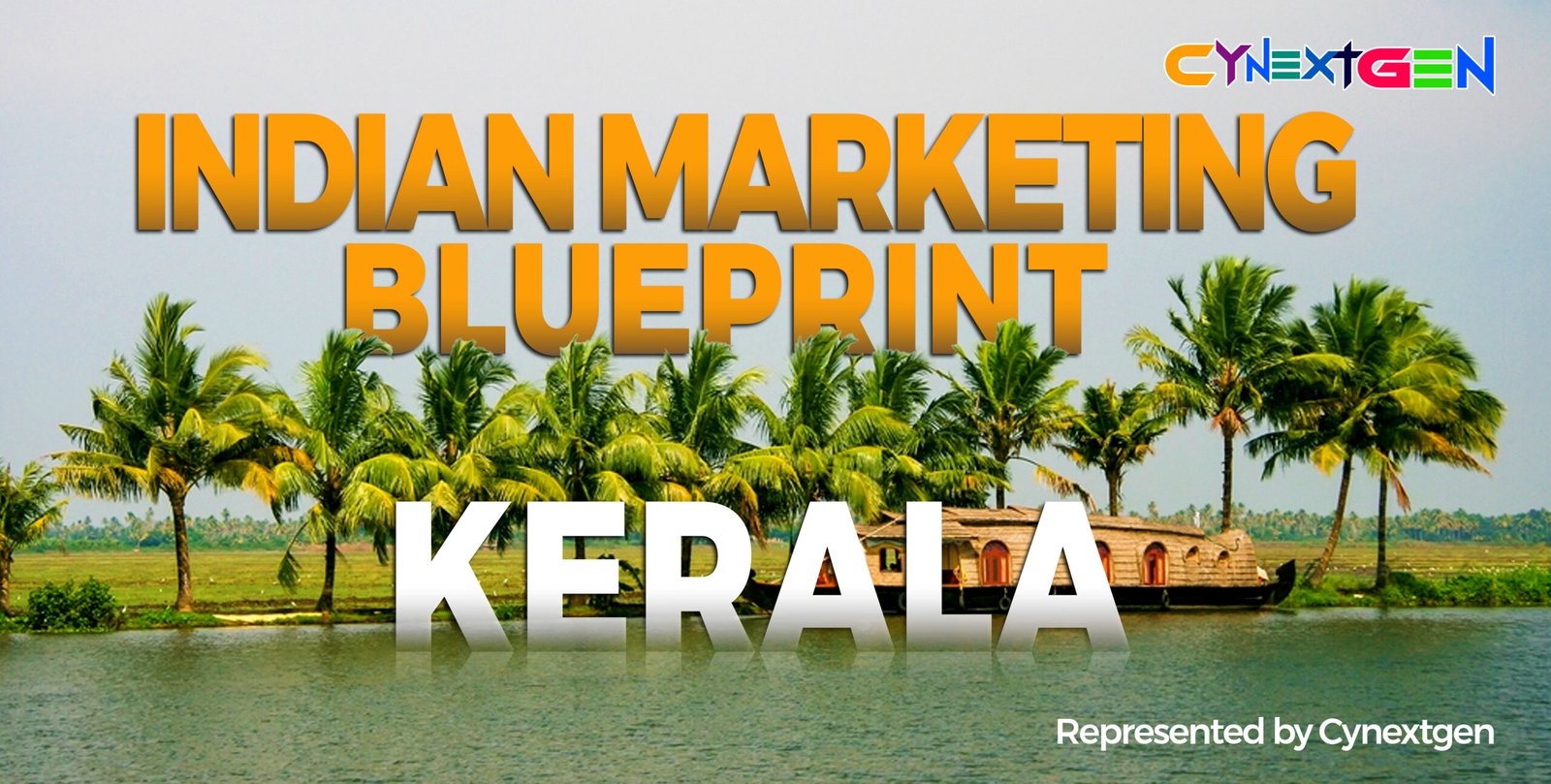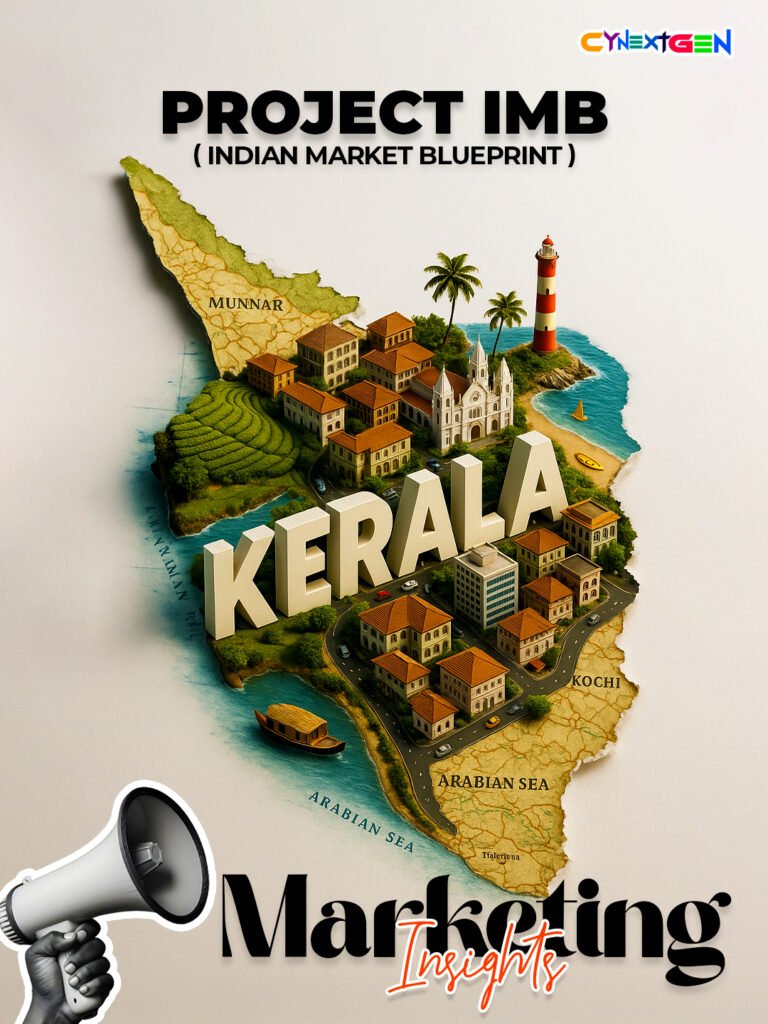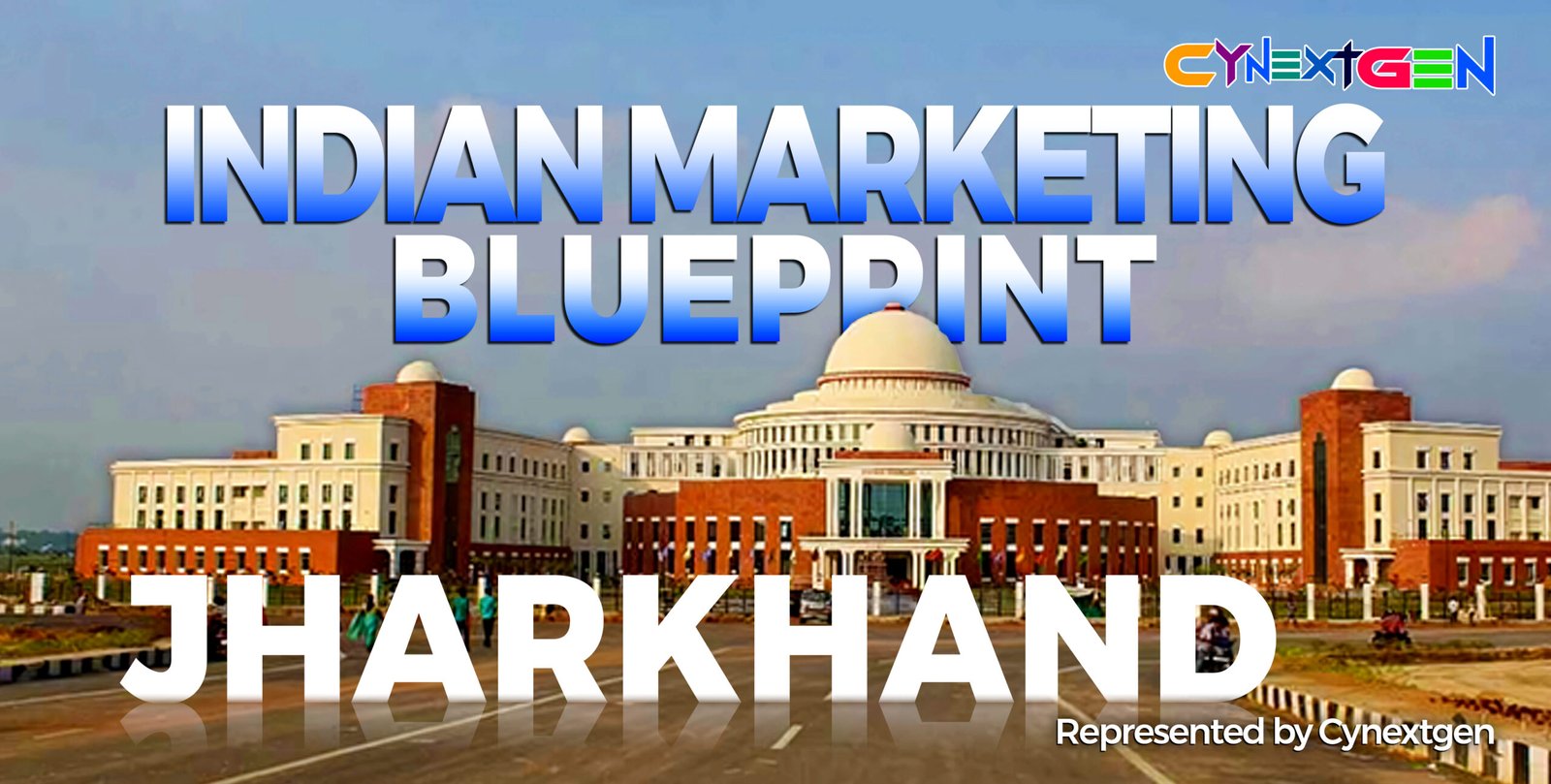
DIGITAL BHARAT PROJECT BY CYNEXTGEN AREA- KERALA
Last updated on September 15th, 2025 at 01:35 pm
Kerala has long been called God’s Own Country, and not just for its backwaters and cultural beauty. The state stands as a unique economic and consumer powerhouse within India. Under the DIGITALBHARAT Project by Cynextgen, Kerala’s evolving economy, FMCG market, and digitally active population present a blueprint for brands aiming to capture high-potential regional markets.
Kerala’s Economic Strength
Kerala’s economy has been steadily growing, with a state GSDP of ₹13.11 lakh crore in 2024–25, valued at around USD 158 billion. The per-capita GSDP stands close to ₹1.76 lakh, almost 1.4 times the Indian average. It reflects not just affluence, but also strong purchasing power across households.
What makes Kerala even more attractive is its low poverty rate of just 0.7% and urbanization nearing 47%. The consumer base here is not limited to cities; both rural and urban regions are equally strong markets. Unlike many other states, Kerala’s consumers are highly literate and deeply aware, shaping demand that prioritizes quality, authenticity, and health.
In recent years, services have driven the bulk of economic growth, with an 8.9% surge in 2023–24. Add to this the growing impact of skilled youth returning home from abroad—reverse migration has empowered Kerala’s consumer class and entrepreneurial ecosystem. State-backed programs like ARYSE-Kerala, K-Store, and nano enterprise schemes have turned young people into both consumers and creators.
For brands working with Cynextgen, this creates a double advantage: a digitally savvy youth audience and a strong pool of local entrepreneurs who can collaborate in building regional supply chains.
FMCG Market Dynamics in Kerala
India’s FMCG sector is already booming, expected to grow from USD 245 billion in 2024 to over USD 1,100 billion by 2033. Kerala fits perfectly into this growth story. While urban demand has plateaued in some categories, rural demand continues to rise. The state’s mix of small-pack units, traditional trade, and loyalty to local brands makes it distinct.
Food and beverages are a dominant category, especially given Kerala’s culture of home cooking and reliance on high-quality oils and spices. Personal care and hygiene are also witnessing a wave of premiumization, with health-conscious families opting for branded and herbal products. Spices like pepper and cardamom, along with Nanma coconut oil, continue to thrive under the “Made in Kerala” identity, showing how provenance-based branding creates trust.

Emerging Growth Sectors
Kerala is not only about FMCG—it is also at the forefront of new industries.
Rise of Health and Wellness
The state is already known globally for Ayurveda and wellness tourism. This identity now extends into Ayurveda-based FMCG, organic foods, and nutraceuticals. Consumers in Kerala prefer authenticity, and brands leveraging Ayurveda and clean-label positioning find instant acceptance.
E-Commerce and Quick Commerce
Digital adoption is high, and young consumers rely on e-commerce platforms for personal care and food products. Quick commerce is gaining popularity in urban centers like Kochi, Thiruvananthapuram, and Kozhikode, where convenience rules buying behavior.
EV Ecosystem
Kerala’s push for sustainable transport is building momentum for electric autos, scooters, and charging infrastructure. Government support is strong, making it one of the states to watch in India’s EV adoption journey. For eco-conscious brands, this aligns perfectly with Kerala’s identity as a green, forward-looking state.
Cynextgen helps brands tap into these sectors by merging digital marketing innovation with Kerala’s cultural narrative—creating campaigns that feel local yet scalable.
Why Kerala Appeals to Brands
Kerala’s consumer market stands apart for several reasons. The population is affluent, literate, and digitally connected. Trust in regional brands is strong, with “Made in Kerala” seen as a mark of authenticity. Government policies supporting MSMEs, youth entrepreneurship, and nano enterprises further add to the business-friendly ecosystem.
Cultural richness also plays a major role. Festivals like Onam and Vishu are not just cultural events but massive economic drivers, spiking sales in food, fashion, jewelry, and FMCG. Temple festivals and pilgrim tourism bring further opportunities, where brands can blend local storytelling with product promotions.
How Brands Can Connect with Kerala Consumers
Success in Kerala requires cultural sensitivity and smart positioning. Brands that use local storytelling—whether through food, festivals, or traditional icons—win consumer trust. Seasonal campaigns around Onam or Vishu resonate strongly, especially when paired with limited-edition packs or festival tie-ins.
Affordability also matters. Small-pack sachets or low-price formats attract youth and rural consumers. At the same time, premium products in health, wellness, and organic segments appeal to urban families.
Distribution must strike a balance between offline and online channels. Local kirana stores and co-operatives remain influential, but digital promotions via Instagram, YouTube, and WhatsApp are essential to reach young buyers. Collaborations with Kerala’s food influencers, wellness experts, or cultural events amplify credibility.
Here, Cynextgen designs omni-channel campaigns that blend modern digital strategies with traditional market dynamics, ensuring brands don’t just enter Kerala—they become part of its cultural fabric.
Case Study: Nanma Coconut Oil and MSME Brands
One of Kerala’s strongest brand stories is Nanma coconut oil, which rose from being a local household product to gaining national recognition. Supported by Kerala government’s K-Store and K-Shoppe initiatives, Nanma and other MSME brands leveraged regional identity, state endorsement, and festival-driven marketing to boost sales.
The success lay in celebrating Kerala’s roots—authenticity, tradition, and clean packaging. However, not all brands succeeded. Some small units faltered by ignoring packaging standards or failing to scale logistics. It shows that regional trust must be backed by strong branding, supply chain efficiency, and a digital presence.
Kerala’s Famous Places and Consumer Culture
Kerala’s economic identity is also shaped by its geography and culture. Cities like Kochi act as commercial gateways, while Thiruvananthapuram blends government, IT, and traditional retail. Tourist hotspots such as Munnar, Alappuzha, and Kovalam not only attract global visitors but also create strong seasonal demand for packaged foods, wellness products, and souvenirs.
Festivals at temples like Sabarimala and Guruvayur drive religious tourism, generating unique opportunities for food, travel, and hospitality brands. Each cultural moment is also a marketing moment—something Cynextgen emphasizes in its DIGITALBHARAT framework.
Kerala’s Future with Cynextgen
Kerala is a state that combines heritage with forward-thinking consumerism. Its people value authenticity, quality, and cultural connection, yet they are quick to adopt digital-first buying habits. For brands, this means opportunity—but also responsibility.
The DIGITALBHARAT Project by Cynextgen captures this duality. By helping businesses localize their messaging while scaling through digital platforms, Cynextgen ensures brands grow within Kerala, not just in Kerala.
As the FMCG, wellness, e-commerce, and EV sectors expand, Kerala will remain one of India’s most attractive regional markets. With its literate and empowered youth, deep cultural richness, and supportive policies, it is truly a land where brands can build lasting trust. And with Cynextgen’s expertise, they can translate that trust into sustainable growth.





Add Comment